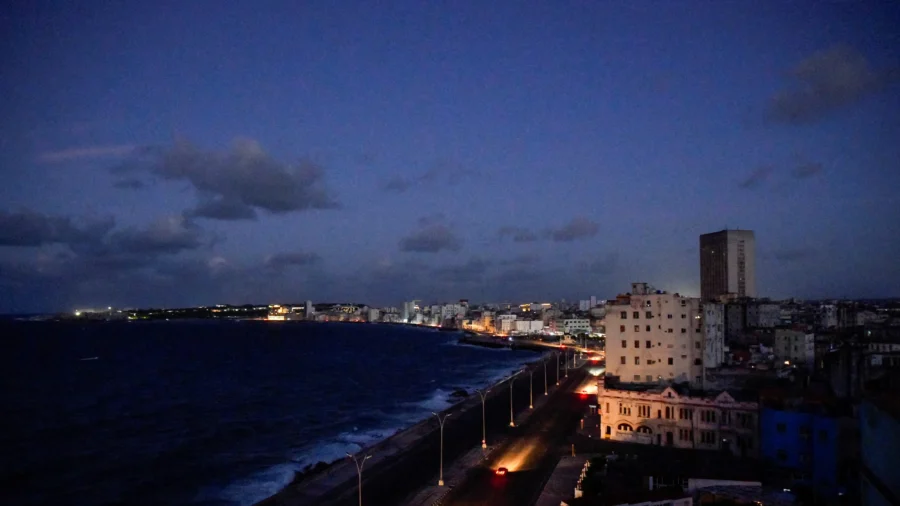HAVANA—Cuba’s electrical grid collapsed again on Sunday, the fourth such failure in 48 hours, raising fresh doubts about a quick fix on an island already suffering from severe shortages of food, fuel, and medicine.
The blackout, after weeks of rolling outages, sparked some small protests around the Caribbean island, where a tropical storm threatened to hamper efforts to restore power.
Cuba’s national electrical grid first crashed around midday on Friday after the island’s largest power plant shut down, sowing chaos and leaving around 10 million people in the dark. The grid has collapsed three times since, underscoring the precarious state of the country’s infrastructure.
The repeated failures mark a major setback in the regime’s efforts to quickly restore power to exhausted residents, a majority of which have already suffered from months of blackouts through the Caribbean’s sultry summer.
The capital Havana was entirely blacked out on Sunday evening, with only scattered businesses, bars and homes running on small fuel-fired generators. Most of the city of two million was quiet. Residents played dominoes on the sidewalk, listened to music on battery-powered radios and sat on doorsteps.
A heavy police presence was visible at points throughout the city.
Reuters journalists witnessed several “cacerolazos”—pot-banging protests common in Latin America—in neighborhoods on the outskirts of Havana.
Protesters angry over shortages of food, water and electricity blocked roads with trash heaps in San Miguel de Padron, a poor neighborhood on the outskirts of the city before being dispersed by security forces.
Earlier on Sunday, Cuba had restored power to 160,000 clients in Havana just prior to the grid’s Sunday collapse, giving some residents a glimmer of hope.
The day took a turn for the worse late in the afternoon, however, when another total grid collapse forced authorities to start again from scratch, raising the specter of a several more days of widespread outages.
Officials initially said power would be restored by Monday or Tuesday. It was not immediately clear how much the latest setback would delay the regime’s efforts.
Those efforts were also hampered by Tropical Storm Oscar, which made landfall on the Caribbean island on Sunday, bringing strong winds, a powerful storm surge and rain to parts of eastern Cuba.
The communist regime canceled school through Wednesday—a near unprecedented move in Cuba—citing the storm and the ongoing energy crisis. Officials said only essential workers should report to work on Monday.
Rising Tensions
Housewife Anabel Gonzalez, of old Havana, a neighborhood popular with tourists, said she was growing desperate after three days without power.
“My cell phone is dead and look at my refrigerator. The little that I had has all gone to waste,” she said, pointing to bare shelves in her two-room home.
Others complained they had not received water since blackouts began.
Internet traffic dropped off sharply in Cuba over the weekend, according to data from internet monitoring group NetBlocks, as vast power outages made it all but impossible for most island residents to charge phones and get online.
The regime has blamed weeks of worsening blackouts—as long as 10 to 20 hours a day across much of the island—on deteriorating infrastructure, fuel shortages, and rising demand.
The Cuban communist regime also blames the U.S. trade embargo, as well as sanctions instituted by then-President Donald Trump, for ongoing difficulties in acquiring fuel and spare parts to operate and maintain its oil-fired plants.
The United States has denied any role in the grid failures.
Cuba depends on imports to feed its largely obsolete, oil-fired power plants. Fuel deliveries to the island have dropped significantly this year as Venezuela, Russia, and Mexico, once important suppliers, have slashed their exports to Cuba.
Ally Venezuela—struggling to supply its own market—cut by half its deliveries of subsidized fuel to Cuba this year, forcing the island to search for more costly oil on the spot market.
Mexico, another frequent supplier, appeared also to have cut fuel flows to Cuba during a presidential election year.
Recently elected President Claudia Sheinbaum has not said if the state-supported supply to Cuba will continue under same terms under her administration.

